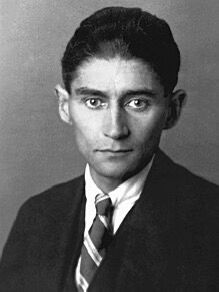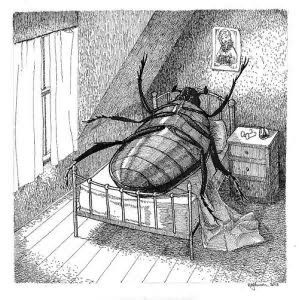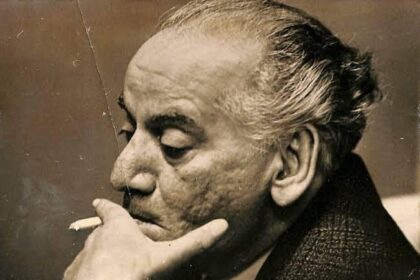Introduction:
Imagine waking up one morning where you transform into an insect and your family completely fails to recognise you. Or imagine that you’re stuck between two nations without having the slightest idea about where your home is. Such themes are explored in Franz Kafka and Saadat Hassan Manto’s work. Stemming from regions that are far apart, with Kafka belonging to Prague and Manto to Pakistan, their writing shares a striking resemblance, one that is further explored in this article. Franz and Manto are known to dive into topics like the alienation of humans from their psyche and environment or the absurdity of purpose with which people spearhead their entire lives. Whether through the surreal bureaucracies from Kafka’s work or the brutal realism exhibited in Manto’s, both expose the deep loneliness and meaninglessness that define human life. Their works are haunting reminders that in a world of indifference, people still search for a sense of purpose, identity, and belonging, only to find that these might just be illusions.
Understanding Alienation and Absurdity:
According to existentialists, alienation is a feeling of detachment from one’s own self and the environment, feeling as if they were an anomaly. Alienation typically derives from life’s inherent absurdity and lack of meaning. Sartre, an existentialist, has noted such a feeling as being an “other” to oneself, using the terms atomised or serialised to describe people who are alienated from one another.
Themes of Alienation and Absurdity of Life in Manto’s Work:

Themes of alienation and absurdity of life can be widely seen in Manto’s work, especially in “Toba Tek Singh.” Set against the backdrop of the partition of India, it explores the story of Bishan Singh, a mentally ill man confined in an asylum in Lahore, bound to be sent to India. The irony of the situation is followed by how Bishan Singh, being “mentally ill,” can still take into account the absurdity of the partition, enforced by an arbitrary decision that neither the patients nor ordinary people are in favour of. His confusion mirrors that of many people in Pakistan and India, resulting in him feeling alienation to such a point that he dies on a patch of land that belongs to neither country, a no-man’s land. His death in the no-man’s land is the ultimate metaphor for the absurdity of life and the pinnacle of alienation, where he cannot feel a sense of belonging to either Pakistan or India. Such themes are also explored in his short stories, “Thanda Gosht” and “Khol do.” In “Thanda Gosht,” the absurdity of human brutalities and the ridiculousness can be seen when the protagonist, Ishwar Singh, is horrified after finding that the girl he was about to defile was dead. This moral descent leads Ishwar Singh towards alienation from himself and his lover. The horrendous realisation that Manto might have symbolised is that he was more horrified by the knowledge that the person he was about to rape was dead and not by the rape itself. Similarly, in “Khol Do,” a father, desperately searching for his lost daughter during the partition of India, becomes a victim of alienation. This can be seen as Sirajuddin, the father, fails to take into account the horror rising from the repeated assaults his daughter, Sakina, faced. Rather, he just comments on how his daughter is alive. This shows how he had to detach himself from reality in order to sustain himself emotionally.
Themes of Alienation and Absurdity of Life in Kafka’s Work:

Such alienation can also be seen in one of the most famous works of Kafka, “Metamorphosis,” where the protagonist’s biggest concern after shifting to an insect is how he’s going to go to work that morning. This exhibits an alienation and detachment from the human psyche, where his own well-being is second to his job. Moreover, in other works, such as “Poseidon,” such alienation and absurdity of existence can be observed when Poseidon, the god of all sea creatures, is stuck with filling out paperwork instead of ruling the oceans. Lastly, in Kafka’s novel, “The Trial,” the protagonist, Joseph K., is arrested without knowing his crime. His struggle against an unseen judicial system reflects the absurdity of such experiences of human existence where meaning itself is elusive and control is just an illusion.
Parallels between Manto and Kafka’s Work: The Universality of Alienation:
Both Manto’s and Kafka’s work share strikingly similar themes of alienation, absurdity, and cruel indifference of the world. Their stories are inhabited by a constant erosion of identity, agency, and meaning. Such is the case, as earlier seen in “Toba Tek Singh,” where Bishan Singh finds himself caught between two nations that deny him a home, similar to Kafka’s “The Trial,” where the absurdity lies in a bureaucratic system that doesn’t offer him clarity nor justice. Similarly, in “Thanda Gosht,” Ishwar Singh’s ethical degradation leads him towards an alienation from himself and his lover, resembling the one Gregor Samsa faces from himself and his family after his transformation in The Metamorphosis. Lastly, with Sakina’s suffering in “Khol Do” processed mechanically by her father, rendering her trauma almost meaningless, it almost resembles the mechanical nature of Kafka’s “Poseidon.”.
Conclusion:
Lastly, whether it’s the faceless legal system from Kafka’s work or the harrowing violence stemming from Manto’s, both writers efficiently depict how individuals are often stripped down to being mere objects, detaching them from their identity and leaving them to navigate a world that is now absurd and inescapable.












